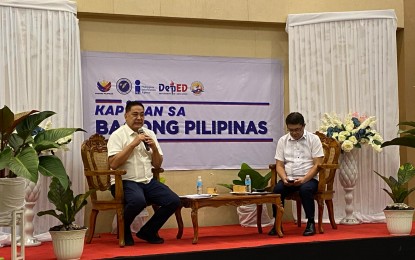
LEARNING PROGRAM. DepEd-Bicol Director Gilbert Sadsad (left) answers media questions during the Kapihan sa Bagong Pilipinas at Casablanca Hotel in Legazpi City on Tuesday (Oct. 15, 2024). DepEd-5 implemented an eight-week learning recovery program to enhance the literacy and numeracy of early-grade learners. (PNA photo by Connie Calipay)
LEGAZPI CITY – The Department of Education (DepEd) 5 (Bicol) has noted significant improvements in the performance of early-grade learners who were part of an eight-week learning recovery program (LRP) designed to enhance their literacy and numeracy skills.
During Tuesday's Kapihan sa Bagong Pilipinas at Casablanca Hotel here, DepEd-5 Director Gilbert Sadsad said the LRP aims to address the effects of the pandemic and recover the learning loss observed in the pupils when they eventually returned to their classrooms.
"This is a pilot program developed by DepEd-5 that was formally launched and implemented in 2022 after we saw the need to respond to the challenges in education, especially among elementary school children. The main focus of the LRP is the implementation of the eight-week curriculum for three years. By 2025, our region visualizes a classroom where every reader is a reader and numerate," Sadsad said.
He added that the program also aims for long-term educational recovery, focusing on and establishing sustainable practices that can enhance educational outcomes.
Sadsad said with the implementation of the LRP and targeted intervention, there was a marked decline in the learners who needed a full refresher or those who needed to be retaught basic foundational skills because they could not even recognize letters and words.
He said a total of 395,147 Grade 1 to 3 learners were assessed through a modified comprehensive rapid literacy assessment along with the acquisition of skills in letter sounds, rhyming words, and sentence reading.
Sadsad said the pupils have steadily progressed to other ability groupings, leaving only 32,718 (8.28 percent) who were full refreshers towards the end of the school year, compared to the 87,939 (22.28 percent) at the beginning of the school year.
"It was also noted that there was a marked increase in the number of Grades 1 to 3 learners who were grade-ready or those who are fitted and can be accepted in the right grade level, from 193,838 (49.11 percent) to 260,836 (66.01 percent)," he said. (PNA)
